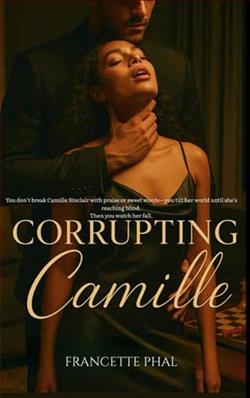Page 39 of Glass Spinner
Well, they didn’t have to worry about hurting Kathleen. Not when it didn’t feel like a performance anymore.
And there lay her dilemma.
Marise closed her eyes. She had three days to work out how the hell she was going to do this without making everything worse.
Things had become complicated. She was juggling too personas now: Veronica, the composed, high-end companion with perfect manners and cultivated charm, and Cass, the sweetly awkward sci-fi nerd who laughed over fries and could disarm a PhD student without blinking.
She wanted to be the realherfor Kathleen, but she didn’t know who that was anymore.
Marise got up, walked slowly toward the window and rested her forehead lightly against the glass.
She’d been alone since she was seventeen.
Her childhood home had been in a part of town where nothing bloomed except graffiti and mortgages. Her mother lived on booze and cigarettes, and had a succession of men in her bed; no-hopers, who drank or sniffed coke. She doubted her mother knew who fathered Marise, but she never made that mistake again. There were no more children.
Some nights Marise went to sleep with a stomach so empty it ached. School was an escape, but she learned quickly not to bring friends home. She taught herself how to cover bruises, hide report cards, and keep quiet. Especially around her mother’s fourth boyfriend, the one with the cold eyes and louder fists. When her mother didn’t protect her, Marise learned to do it herself.
By fifteen, she was working. Cleaning rooms at a motel on the edge of town. Paid in cash, no questions asked. By sixteen, she was waiting tables at a dingy dine-in. The smell of grease clung to her skin. After handing over a portion to her mother, she hid the rest under a floorboard.
By seventeen, she had enough saved to escape the misery.
She’d left home with nothing but a second-hand backpack and a high school diploma. Her mother hadn’t stopped her, merely watched from the porch with a cigarette between twofingers, a beer in the other hand, and an expression that said,you’ll be back when you run out of money.
Marise never returned.
The streets were no safer, but at least she wasn't trapped in the hopeless cycle. For the first four weeks, she crashed on couches, stayed in hostels, and slept in a youth shelter, learning the life of shared beds and stolen food. Then she found a room in a falling-down share house with four girls, with one bathroom, mould on the ceiling, and a German shepherd that barked at everything except burglars. When the hot water ran out—which was often—she showered at the old gym down the road.
Her first job was the evening shift at McDonalds. During the day, she worked the front desk of a bulk billing medical clinic. There she juggled health forms and breathed through the stench of antiseptic and people’s bad tempers. On the weekends, she worked in a garage, which was more of a relaxation for she loved cars.
Her body was a machine, earning her enough to get a degree to escape the poverty cycle she was entrenched in. She enrolled in a community college, taking one subject at a time, studying Psychology. Not to help people, but to understand why people hurt each other. Why they kept doing it and why no one ever stopped them.
There were nights she cried herself to sleep, not because she was sad, but because she was exhausted. There was no glamour in survival. Only persistence. Getting through the next shift, the next lecture, the next overdue bill.
She was mugged once walking home from a shift, and was left on the pavement with a black eye and a cracked tooth. After that, she took a self-defence class. She found a women’s boxing studio in the back of a mechanic’s garage, rough and cheap. She learned to punch, to pivot, to fight dirty if she had to. Not for sport, but for safety. For the three seconds that matteredwhen someone grabbed you by the collar. She learned how to fight standing, to read her opponent, to watch their balance, and throw her weight into a throat punch.
She studied at night for the psychology degree. It was slow at first, two subjects a semester or three if she could manage them. She printed her textbooks at the library to save money, learned to eat cheap and stretch groceries past the use-by date. There were nights when she didn't sleep at all, mornings when she stared at herself in the mirror and thought,this is killing you, but she kept going. There was no one to hand her a future.
It had taken her six years instead of four to finish. Six years of double shifts, second-hand laptops, scrappy dinners, and pretending she wasn’t tired all the time. After she graduated, her first real job had been at a crisis hotline, taking calls in the dead of night from people who needed someone—anyone—to hear them. At first, she believed in the work. Thought she was doing good, but eventually, it wore her down. The repeat callers. The hang-ups. The ones who thanked her and then topped themselves. It chipped away at something inside her.
When a private risk consultancy offered a position doing behavioural profiling, it felt like a lifeline and she jumped at the chance. Twice the pay, with daylight hours, a desk and a business card. At first, it was clean work, mainly psychological profiling for managerial roles. She did the risk assessment and personality testing. Catching red flags before they were employed were her specialty, but the firm had layers she didn’t notice at first.
They weren’t only screening corporate hires. They were also contracted, discreetly, by political donors, government departments, private equity giants. Clients who wanted more than risk assessments. They wanted leverage.
Marise was tasked with conducting “personal ecosystem reviews.” Which, in practice, meant mapping every contact insomeone’s life. Friends, lovers, roommates, exes, professors, mentors. She ran digital footprints, combed through deleted social media, and cross-referenced metadata from dating apps and online purchases. The firm had access to private sites and they used them without blinking.
She was good at it, catching patterns others missed.
Then the job changed even more. They paid her to find weaknesses they could use. If someone had a drinking problem, she flagged it. If someone’s partner had a sibling with an arrest record, she documented it. If someone volunteered for the wrong charity, she highlighted it.
It wasn’t illegal. It was something worse.
She wrote one report that made her sick. A mid-level clerk in a government department, who was a bright kid with a clean background. She uncovered that his fiancée had been arrested during a college protest seven years earlier. There were no charges laid, nothing violent, it was political. The client wanted justification to freeze him out so she gave him that.
The clerk was sidelined within the month, and she never heard what happened to him.
But she never forgave herself.
After that, Marise stopped pretending. The work wasn’t about risk; it was about control. Information was power, packaged with polished language and plausible lies.















